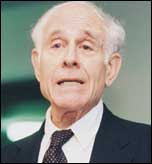 |
 |
 |
 |
|
COLUMBIA FORUM When Professor of Philosophy Emeritus Richard Kuhns received the eighth annual award for Distinguished Service to the Core Curriculum (with Professor of Russian Emeritus Robert Belknap) on November 14, 2000, it capped a 50-year relationship with the core. Kuhns, who won the Mark Van Doren Teaching Award in 1992, began teaching Literature Humanities in 1950, and has taught Contemporary Civilization and chaired the Literature Humanities program as well. He used his acceptance speech to meditate what we mean when we use the word "core."
The word "core" invokes a variety of thoughts and associations: According to one derivation, core derives from Latin cor, meaning heart; hence core is the heart of the fruit, the central structure of an argument, the armature of a sculptural work of art. Core may also derive from French corps meaning body, the central living presence. It may also come from cor meaning horn, and in that aspect of its derivation it assumes some connotations that are especially relevant to our students, for they feel at times "cored" (as if gored by the horn of their books) and further that the core is a strangulation in the throat, something you cannot swallow. or wished you had not been assigned. Core has an earlier Old English form in colk, which can mean hollow or empty. Indeed, where no book has been, we are hollow and empty, and when the book has become part of us, we are plentiful in the core. Since I subscribe to conflict theory, I declare core to assert the heart and at the same time the heartless, or full and empty. And its bi-valence - its being at once full of meaning and destitute of meaning - must enclose both the center and pith, and that which you cannot spit out, something you can't get over, which is certainly our endless involvement with the core. It arouses then deep passion, and that, too, is embedded in the word: I quote a preacher who said, "We are all choked with the core of carnal concupiscence." Obviously core is one of those terms and concepts that have a moral and spiritual meaning, a philosophical implication as well as a down to earth bodily connotation, somewhat like the Greek term katharsis. So, when we say "core" or "core curriculum," we are implying a metaphorical transfer from core's more aggressive and hard-boiled senses, choosing to emphasize its benign, digestible (no sticking in the throat, no embracing carnal concupiscence). Perhaps we intend a true cornucopia. Lifelong involvement with the pith of it all makes us ever more sensitive to two inseparable forces that are themes in any human life: metamorphosis and immortality. In the words of Henry James: "Art prolongs, it preserves, it consecrates, it raises from the dead." And also by [Luigi] Pirandello: "If you are lucky enough to be born as a character, you have nothing to fear from death. You don't die." Such thoughts are part of almost every book we read as we dash through our syllabuses, and they play off against each other in the books that are in my core, and within that core, the pivot on which the whole order turns is to be found as far as I'm concerned in Apuleius' Metamorphoses, also known as The Golden Ass, and Boccaccio's Decameron. They are clear about the claims Pirandello and James made. In The Golden Ass, the character Lucius, having undergone a metamorphosed state as an ass, gains immortality through the Priest of Isis and the goddess Isis who allow him to resume his human shape. If the hero had simply remained an ass and his adventures continued, salvation would be achieved only if the tales unwound endlessly, but they cannot since we don't, and therefore salvation comes through a power higher than that of the storyteller. Endlessness was, however, nearly realized in the Thousand Nights and One Night, and you will remember that Scheherzade escaped death by expanding her storytelling powers and her sexual attractiveness to overwhelm the Sultan. Eternal life is implied by the survival of and overcoming of the Sultan's barbaric anti-woman obsession: she overwhelmed his death urges, gave him three children, and to us who read, the belief in storytelling's immortal powers. In the Decameron, to leave plague-ridden Florence for 10 days of storytelling certainly bestows long life on the brigata - the band of young women and men - who thereby escaped the Black Death, and who furnish us with the means to alleviate our own anxieties against not only disease and death, but also the dangers of taking ourselves and our beliefs with too great seriousness. In my fantasies, Lucius and Boccaccio and Scheherzade must be entertaining one another in a great variety of ways with a great variety of stories this very instant. Well, perhaps that sort of conversation and storytelling represents the center, the pith, the core.
|
|
|||||||||||||||||||||||||||||||||||||||||||||||||||||||||||||||||||||||||
